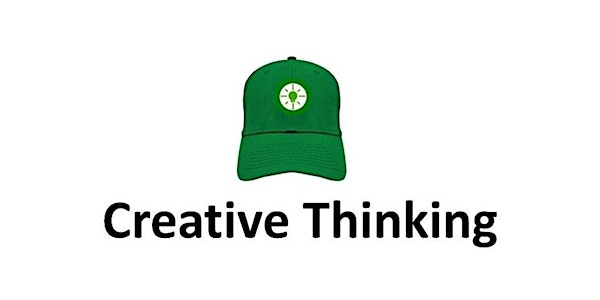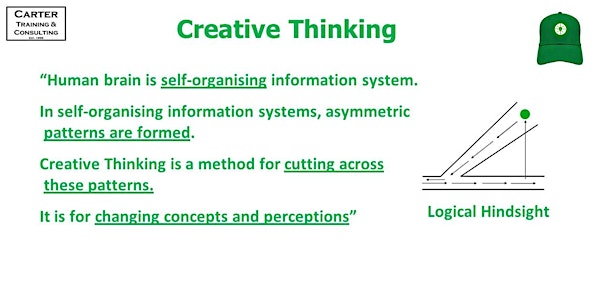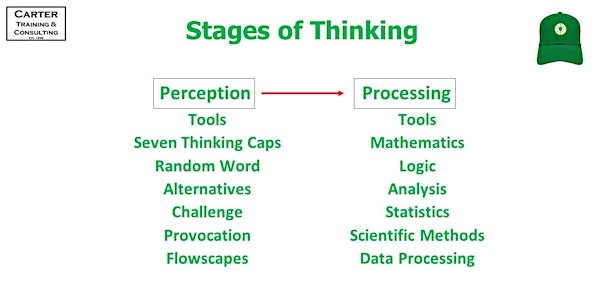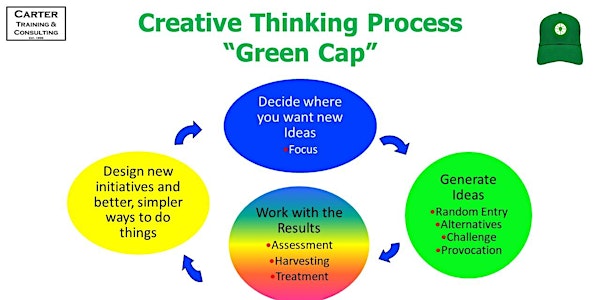
Creative Thinking in Darwin from $225
The human brain is NOT designed to be highly creative. Creative Thinking requires tools to break behaviour patterns and create new ideas.
Location
Regus - Darwin, 66 Smith Street
66 Smith Street #Level 4 and 5 Darwin City, NT 0800 AustraliaRefund Policy
About this event
- 8 hours
Organized by
COURSE SUMMARIES
1. Seven Thinking Caps (STC) – 1 day, 6-24 people. Free introduction recommended.
Western thinking is based on debate, critical thinking and position-taking which places people as opponents that can lead to argument and conflict which waste time and reduce thinking effectiveness. Also most peoples’ thinking is mixed leading to confusion and emotional responses in problem solving.
Course structure: History of Western thinking and need to move from debate to co-operative exploration,
Learn to divide thinking into Seven different styles and consider each together with other people, Apply Seven Caps in various situations including self-thinking, meetings, conversations and writing.
Learning Outcome: This course will train participants to divide thinking into Seven different styles and consider each separately, with all people thinking together in each style. Participants will learn to improve their thinking, increase teamwork, reduce time to make better decisions, and reduce time in meetings.
Who Should Attend? People needing to improve productivity, teamwork, decision making & save time.
2. Creative Thinking (CT) – 2 days, 2 modules, 6-18 people. Seven Caps required training.
The human brain is not designed to be highly creative. It creates neurological networks to form behaviour patterns. Creative Thinking requires tools to allow people to break these patterns and create new concepts which lead to ideas and valuable new products or services.
Course structure: Module 1: Focus: Sharpen or change focus to improve creative efforts, Alternatives/Concept Extraction: Use concepts to breed new ideas, Challenge: Break free from limits of accepted methods Random Entry: Use unconnected input to open new lines of thinking.
Module 2: Provocation: Move from provocative statements to useful ideas, Harvesting: Select best early ideas and shape into usable approaches, Treatment of Ideas: Develop ideas and shape to fit.
Leaning Outcome: manage creative process, create new ideas, develop innovative ideas, be proactive.
Who Should Attend? Anyone who wants a disciplined process for innovation, idea generation, concept development, creative problem solving, or a strategy to challenge the current situation.
3. Presentation Skills (PS) - 2 days, 3-12 people.
This course will provide participants with the knowledge and skills to confidently and effectively present to a live audience in any situation. It combines theory and practice for designing a presentation to achieve objectives through clear communication and methods to effectively answer questions and support credibility.
Course Structure: Overview of Presentation skills, What is an Effective Presentation?, Stages of Presenting, Audio Visual Support Material, Body Language, Delivery Methods, Presentation Practice, Stage Fright & Nerves, Tips & Mistakes, Practice & Evaluation (Video recorded).
Learning Outcome All participants will gain skills to design and present confidently and effectively.
Who should attend? Anyone needing to improve skills to confidently present to live audiences.
4. Customer Service (CS) - 1 day, 6-24 people.
Customer service is the organisation and its individuals providing products and services to meet expectations of customers. Customers generate sales and profits. Satisfied Customers generate more sales. Excellent Customer Service is a valuable source of competitive advantage.
Course Structure: Overview of Customer Service, Improving Customer Service, Customer Service in your Organisation, Customer Service in Management, Selling with Service, Good Customer Service Habits, Managing Customer Complaints, Customer Service Communication
Learning Outcome: Improve Customer Service skills, Maintain consistent & proactive approach to Customer Service, Build relationships with Customers, Increase Sales & Profit via Excellent Service.
Who Should Attend? People who communicate with internal and external Customers.
5. Time Management (TM) - 1/2 day, 6-24 people.
Personal time management skills are essential for professional success in any workplace. Those able to successfully implement time management strategies are able to control their workload rather than spend each day in a frenzy of activity reacting to crisis after crisis - stress declines and personal productivity increases. These highly effective individuals are able to focus on the tasks with the greatest impact to them and their organization.
Course Structure: Understand value of Planning, Understand value of Time as a resource, Understand theory of Time Management, Learn methods to improve Time Management, Apply methods to improve Time Management
Learning Outcome: All participants will gain skills to set clear objectives and manage tasks and people who demand their time. They will improve their time and task management therefore gaining efficiency.
Who Should Attend? Anyone who needs to improve their time and task management.



